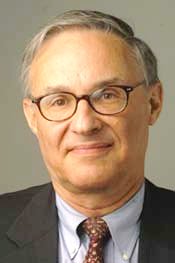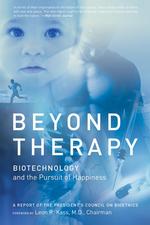BRAVE NEW BIOLOGY: THE CHALLENGE FOR HUMAN DIGNITY
Professional Experience: Chairman, President's Council on Bioethics, 2001- 2005. W. H. Brady, Jr., Distinguished Fellow, American Enterprise Institute, 1991-1992, 1998-1999. Senior fellow, MacLean Center for Clinical Medical Ethics, The University of Chicago, 1991-2001. Senior fellow and associate director, John M. Olin Center for Inquiry into the Theory and Practice of Democracy, The University of Chicago, 1986-2001. Member, vice-chairman, and committee chairman, National Council on the Humanities/National Endowment for the Humanities, 1984-1991. Professor, The College and the Committee on Social Thought, The University of Chicago, 1976-2001. Research professor in bioethics, The Kennedy Institute of Ethics, Georgetown University, 1974-1976. Tutor, St. John's College, 1972-1976. Executive secretary, Committee on the Life Sciences and Social Policy, National Research Council/National Academy of Sciences, 1970-1972. Staff fellow, Laboratory of Molecular Biology, National Institute of Arthritis and Metabolic Diseases, National Institutes of Health, 1967-1970. Surgeon, United States Public Health Service, 1967-1969. Intern, Beth Israel Hospital, 1962-1963. Education: Ph.D, biochemistry, Harvard University. M.D., honors, University of Chicago. B.S., biology, honors, University of Chicago. With the aim of perpetuating the ideals espoused and work carried out by the engineer Dr. Rafael Escola so that professionals could do their job with technical competence and ethical inspiration, the Rafael Escola Foundation has signed an agreement with the School of Engineering of the University of Navarra, TECNUN, in order to create the Rafael Escola Chair of Ethics.  [León R. Kass, titular de la Cátedra Addie Clark Harding de Pensamiento Social en la Universidad de Chicago, es licenciado en Ciencias Biológicas y en Medicina. Completó su formación científica con la presentación de una tesis doctoral en Bioquímica en la Universidad de Harvard en 1967. Tras ejercer durante varios años como investigador de biología molecular en el Instituto Nacional de Salud y en el Servicio de Salud Pública de los EE.UU., cambió la orientación y el enfoque de su trabajo hacia el estudio de las cuestiones éticas, políticas, religiosas y culturales que surgen a partir de los avances biomédicos. Gran parte de su acierto –y de su éxito– se debe al tratamiento multidisciplinar e integral que ha dispensado a estos problemas.
[León R. Kass, titular de la Cátedra Addie Clark Harding de Pensamiento Social en la Universidad de Chicago, es licenciado en Ciencias Biológicas y en Medicina. Completó su formación científica con la presentación de una tesis doctoral en Bioquímica en la Universidad de Harvard en 1967. Tras ejercer durante varios años como investigador de biología molecular en el Instituto Nacional de Salud y en el Servicio de Salud Pública de los EE.UU., cambió la orientación y el enfoque de su trabajo hacia el estudio de las cuestiones éticas, políticas, religiosas y culturales que surgen a partir de los avances biomédicos. Gran parte de su acierto –y de su éxito– se debe al tratamiento multidisciplinar e integral que ha dispensado a estos problemas.
En 1969, Kass fundó el Centro Hastings, el primer instituto dedicado a la investigación bioética en el mundo. A continuación fue nombrado Secretario Ejecutivo del Comité de las Ciencias de la Vida y de la Política Social de la Academia Nacional de las Ciencias. Fruto de su trabajo en dicho Comité fue el documento “Assessing Biomedical Technologies”, un estudio pionero sobre los conflictos éticos y sociales que provoca la utilización de las nuevas tecnologías de la vida. Entre 2001 y 2005 fue Director del Consejo de Bioética del presidente George W. Bush.
Sus numerosas obras incluyen “Toward a More Natural Science: Biology and Human Affairs” (1985), “The Ethics of Human Cloning” (1998) y “Beyond Therapy: Biotechnology and the Pursuit of Happiness” (2003). Además, junto con la profesora Amy A. Kass, su esposa desde hace más de 40 años, preparó “Wing to Wing, Oar to Oar: Readings on Courting and Marrying” (2000), una antología de textos para un curso sobre la ética de la vida cotidiana.
El texto que ahora publicamos en inglés es la 3ª lección conmemorativa de la Cátedra Rafael Escolá de Ética Profesional que Leon R. Kass pronunció en TECNUN (San Sebastián), el pasado 17 de marzo.]
********************* [Dr. Kass researches bioethics, ethics, philosophy, marriage, family, and social mores. He was chairman of the President's Council on Bioethics, which has released Human Cloning and Human Dignity (2002) and Beyond Therapy (2003).
[Dr. Kass researches bioethics, ethics, philosophy, marriage, family, and social mores. He was chairman of the President's Council on Bioethics, which has released Human Cloning and Human Dignity (2002) and Beyond Therapy (2003).
#327 Varios Categoria-Varios: Etica y Antropologia
by Leon R. Kass
________________________
The urgency of the great political struggles of the twentieth century and the new global struggle against terrorism and fanaticism seems to have blinded many people to a deep truth about the present age: nearly all contemporary societies, East as well as West, are traveling briskly in the same utopian direction. Nearly all are wedded to the modern technological project; all march eagerly to the drums of progress and fly proudly the banner of modern science; all sing loudly the Baconian anthem, “Conquer nature, relieve man's estate.” Leading the triumphal procession is modern medicine, which is daily becoming ever more powerful in its battle against disease, decay, and death, thanks especially to astonishing achievements in biomedical science and technology -achievements for which we must surely be grateful.
Yet contemplating present and projected advances in genetic and reproductive technologies, in neuroscience and psychopharmacology, in the development of artificial organs and computer-chip implants for human brains, and in research to control biological aging, we now clearly recognize new uses for biotechnical power that soar beyond the traditional medical goals of healing disease and relieving suffering. We are promised new and effective routes to better children, superior performance, ageless bodies, and happy souls [1].
(more)









0 Comments:
Publicar un comentario
<< Home